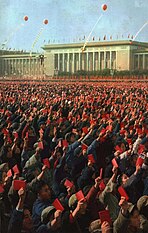The Chinese New Left is a term used in the People's Republic of China to describe a diverse range of left-wing political philosophies that emerged in the 1990s that are critical of the economic reforms instituted under Deng Xiaoping, which emphasized policies of market liberalization and privatization to promote economic growth and modernization.
Liberal elite, also referred to as the metropolitan elite or progressive elite, is a term used to describe politically liberal people whose education has traditionally opened the doors to affluence, wealth and power and who form a managerial elite. It is commonly invoked pejoratively, with the implication that the people who claim to support the rights of the working class are themselves members of the ruling classes and are therefore out of touch with the real needs of the people they say that they support and protect.
Sovereigntism, sovereignism or souverainism is the notion of having control over one's conditions of existence, whether at the level of the self, social group, region, nation or globe. Typically used for describing the acquiring or preserving political independence of a nation or a region, a sovereigntist aims to "take back control" from perceived powerful forces, either against internal subversive minority groups, or from external global governance institutions, federalism and supranational unions. It generally leans instead toward isolationism, and can be associated with certain independence movements, but has also been used to justify violating the independence of other nations.
In the People's Republic of China since 1967, the terms "ultra-left" and "left communist" refers to political theory and practice self-defined as further "left" than that of the central Maoist leaders at the height of the Great Proletarian Cultural Revolution (GPCR). The terms are also used retroactively to describe some early 20th century Chinese anarchist orientations. As a slur, the Chinese Communist Party (CCP) has used the term "ultra-left" more broadly to denounce any orientation it considers further "left" than the party line. According to the latter usage, the CCP Central Committee denounced in 1978 as "ultra-left" the line of Mao Zedong from 1956 until his death in 1976. This article refers only to 1) the self-defined ultra-left of the GPCR; and 2) more recent theoretical trends drawing inspiration from the GPCR ultra-left, China's anarchist legacy and international "left communist" traditions.

The Emperor in Han Dynasty, also released under the title The Emperor Han Wu in some countries, is a 2005 Chinese historical drama television series based on the life of Emperor Wu of the Han dynasty. It uses the historical texts Records of the Grand Historian and Book of Han as its source material.

Right-wing populism, also called national populism and right-wing nationalism, is a political ideology that combines right-wing politics and populist rhetoric and themes. Its rhetoric employs anti-elitist sentiments, opposition to the Establishment, and speaking to or for the "common people". Recurring themes of right-wing populists include neo-nationalism, social conservatism, economic nationalism and fiscal conservatism. Frequently, they aim to defend a national culture, identity, and economy against perceived attacks by outsiders. Right-wing populism has remained the dominant political force in the Republican Party in the United States since the 2010s.
The politics of Guizhou Province in the People's Republic of China is structured in a dual party-government system like all other governing institutions in mainland China.
Left-wing nationalism or leftist nationalism is a form of nationalism which is based upon national self-determination, popular sovereignty, and left-wing political positions such as social equality. Left-wing nationalism can also include anti-imperialism and national liberation movements. Left-wing nationalism often stands in contrast to right-wing politics and right-wing nationalism.
Neo-nationalism, or new nationalism, is an ideology and political movement built on the basic characteristics of classical nationalism. It developed to its final form by applying elements with reactionary character generated as a reaction to the political, economic and socio-cultural changes that came with globalization during the second wave of globalization in the 1980s.

The White Terror was the political repression of Taiwanese civilians and political dissenters under the Kuomintang (KMT)-ruled government. The period of White Terror is generally considered to have begun when martial law was declared in Taiwan on 19 May 1949, which was enabled by the 1948 Temporary Provisions against the Communist Rebellion, and ended on 21 September 1992 with the repeal of Article 100 of the Criminal Code, allowing for the prosecution of "anti-state" activities. The Temporary Provisions were repealed a year earlier on 22 April 1991 and martial law was lifted on 15 July 1987.
Chinese Internet slang refers to various kinds of Internet slang used by people on the Chinese Internet. It is often coined in response to events, the influence of the mass media and foreign culture, and the desires of users to simplify and update the Chinese language. Slang that first appears on the Internet is often adopted to become current in everyday life. It includes content relating to all aspects of social life, mass media, economic, and political topics and the like. Internet slang is arguably the fastest-changing aspect of the language, created by a number of different influences—technology, mass media and foreign culture amongst others.

Chen Changhao (simplified Chinese: 陈昌浩; traditional Chinese: 陳昌浩; pinyin: Chén Chānghào; 18 September 1906 – 30 July 1967) was a member of the 28 Bolsheviks and an important military figure of Zhang Guotao's 4th Red Army from Hanyang, Wuhan. Chen had also been known as Cangmu.

The alt-right is a far-right, white nationalist movement. A largely online phenomenon, the alt-right originated in the United States during the late 2000s before increasing in popularity and establishing a presence in other countries during the mid-2010s, and has been declining since 2017. The term is ill-defined and has been used in different ways by academics, journalists, media commentators, and alt-right members themselves.
Netto-uyoku or net uyoku, often shortened to neto-uyo (ネトウヨ), is the term used to refer to Japanese netizens who espouse ultranationalist far-right views on social media. Netto-uyoku is evaluated as sharing similarities to Western right-wing populism or the alt-right.

With You is a 2016 Chinese streaming television series based on the novel The Best of Us (最好的我们) by Ba Yue Chang An (八月长安). It stars Liu Haoran and Tan Songyun in lead. It aired on iQiyi from 8 April to 14 May 2016.
Shen Yue is a Chinese actress, singer and model. She is known for her leading roles in the television series A Love So Beautiful (2017), Meteor Garden (2018), Count Your Lucky Stars (2020) and Mr. Bad (2022).

Arsenal Military Academy, starring Bai Lu, Xu Kai, Li Chengbin and Wu Jiayi in main roles. It is a 2019 Chinese streaming television series, directed by Hue Kaidong. The series tells the story of Xie Xiang, who disguises herself as a male student under her brother's name to join the military academy.
Chong Er's Preach, also known as The Legend of Chong Er is a 2019 Chinese historical romantic comedy television series directed by Lai Shuiqing and Zhao Jian and starring Wang Longhua, Baby Zhang, Zhang Yishan, Madina Memet, Purba Rgyal, Shen Mengchen, and Gan Tingting. It is produced jointly by China Film Group Corporation, Global Hao Xiang Television Media and Shenzhen Yucong Cultural Media Co., Ltd.. The television series follows the story of the Duke Wen of Jin from exile to later ascending the throne to become king. This television series has a 2.6 rating on Douban.











